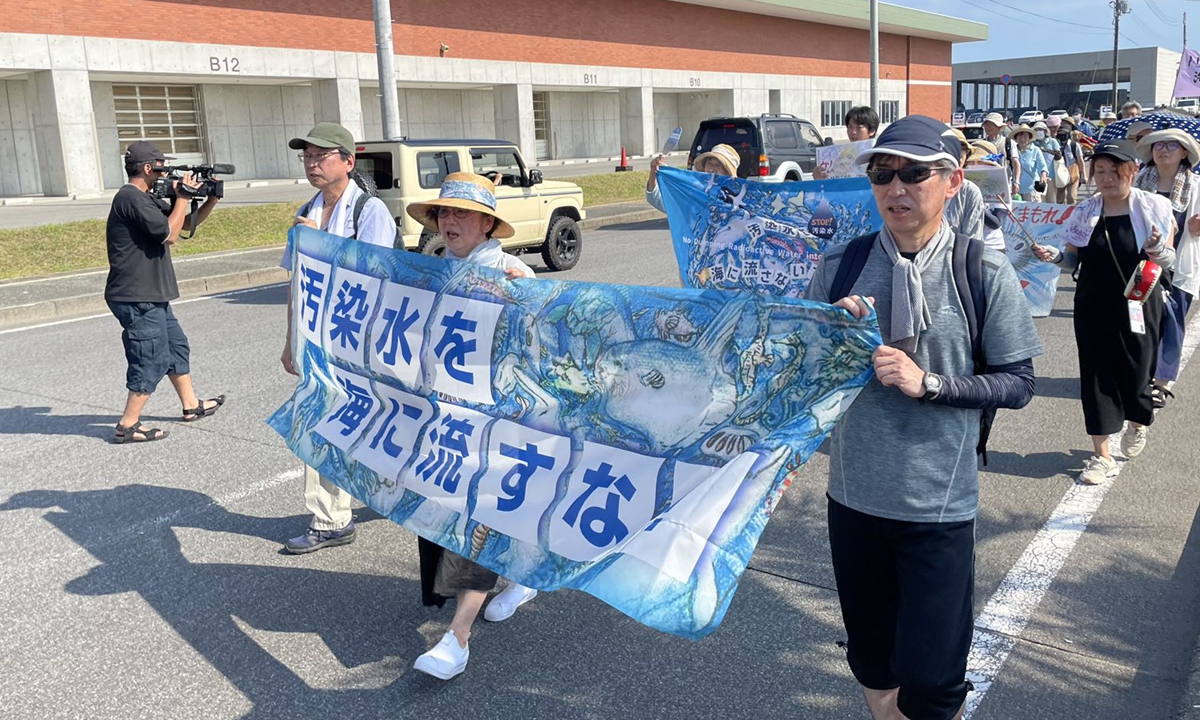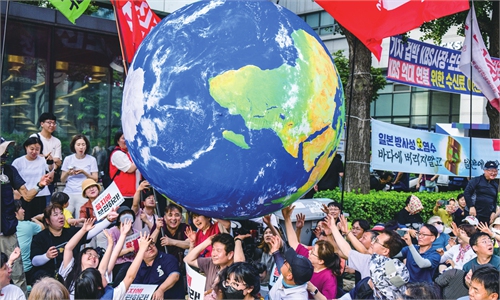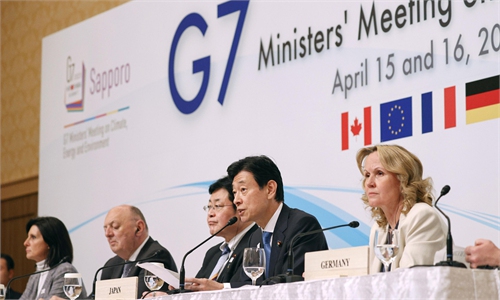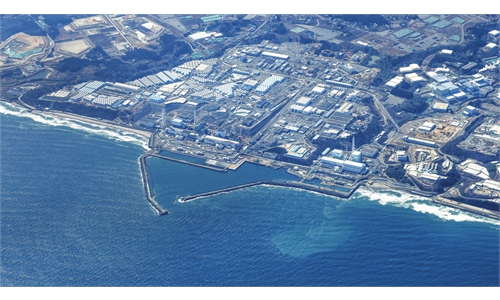Kishida's approval rate nears lowest level over nuke-contaminated wastewater dumping woes

Holding banners that read "Don't dump the contaminated water into the sea," fishermen, fish immunology and genetic breeding experts and other local residents in Iwaki, Fukushima Prefecture take the street on July 17, 2023, to protest against Japanese government's plan to dump nuclear-contaminated wastewater into the ocean. Photo: Courtesy of Yoshitaka Ikarashi, a resident of Iwaki
Approval rate for Japanese Prime Minister Fumio Kishida's cabinet continued to fall and neared the lowest level in his tenure amid mounting concerns over Japanese government's plan to dump the Fukushima nuclear-contaminated wastewater into the sea, according to the latest poll conducted by Japanese media outlet Kyodo News.No matter how Japanese government and TEPCO - the operator of the crippled Fukushima Daiichi nuclear power plant - repeated their narrative of the "safety" of the so-called ALPS-treated water, the poll results once again revealed that the explanations by Tokyo and TEPCO over the issue failed to convince the public, Chinese observers said.
According to a Kyodo News poll Sunday, as the Japanese government grapples with the trouble-plagued national identification card system and concerns over Fukushima nuclear disaster cleanup efforts, the approval rating for Kishida's cabinet continued to slide to 34.3 percent, nearing the lowest level in his tenure, while the disapproval rating increased to 48.6 percent from 41.6 percent in the previous poll conducted in mid-June.
The support rate for the ruling Liberal Democratic Party (LDP) stood at 30.1 percent, the lowest since LDP returned to power in December 2012.
Despite the criticism and opposition at home and abroad, the Japanese government is pressing ahead with its plan to dump the nuclear-contaminated wastewater into the Pacific Ocean.
The poll showed 80.3 percent of respondents said they felt the explanation provided by the government on the issue was insufficient. And 87.4 percent of the interviewees said the nuclear-contaminated wastewater dumping will more or less result in economic damage.
So far, the Japanese government has only committed to starting the dumping some time "around the summer," but Kyodo noted that August could be a possible option, considering Kishida's busy diplomatic schedule and possible cabinet reshuffle in September.
Plagued by flagging public support ratings, Kishida plans to reshuffle his cabinet around mid-September, Japanese media outlet Asahi Shimbun cited 何时?several high-ranking government sources as saying.
Also, Asahi noted that stemming the decline in support might convince Kishida to dissolve the Lower House and call a snap election this autumn.
But Da Zhigang, director of the Institute of Northeast Asian Studies at Heilongjiang Provincial Academy of Social Sciences, takes a different view. He believes that precisely because of the continuous decline in the approval rating for Kishida's cabinet, the Japanese prime minister is more unwilling to take a risk and dissolve the Lower House ahead of time considering his term as LDP president expires at the end of September 2024.
Da warned that before Kishida reshuffles his cabinet and dissolves the Lower House, the Japanese government is likely to hype other domestic and international issues to shift public attention away from the negative effects of the disposal of Fukushima nuclear-contaminated wastewater and ID card system issues.
He also expressed his concern that the Japanese government may intensify its PR stunts on efforts to whitewash its image at home and abroad over the contaminated wastewater dumping plan. For example, the Japanese government is likely to smear China for politicizing the issue and misleading public opinion.
But environmental experts stressed that Japan cannot call white black, as the dumping plan is a political decision that disregards human rights and interests as well as the marine environment.
On Monday, a large-scale protest against the dumping plan organized by a Japanese environmental NGO and city assembly kicked off in Iwaki, Fukushima Prefecure. The parade brought together around 200 to 300 residents across the country including local fishermen and the representatives of fisheries associations, experts on fish immunology and genetics and breeding, Yoshitaka Ikarashi, a resident of Iwaki who joined the protest, told the Global Times on Monday.
Ikarashi noted that the protest attracted reporters from China and South Korea.
"The sea of our hometown, the sea of Japan, the sea of the world must not be polluted by radioactivity anymore," read the poster of the parade sent by Ikarashi.




